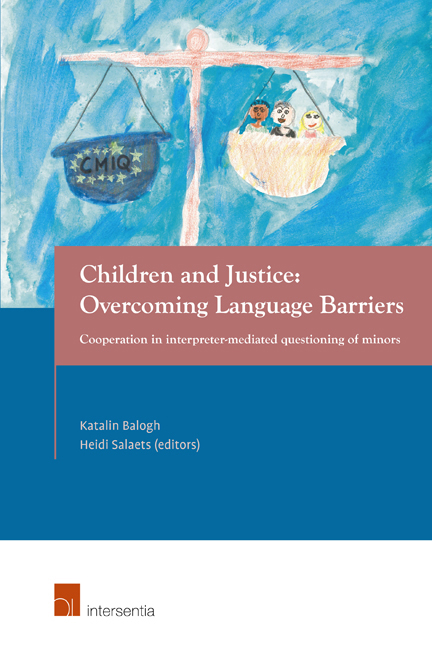 Children and Justice: Overcoming Language Barriers
Children and Justice: Overcoming Language Barriers Chapter 2 - Interpreted interviews with minors
Published online by Cambridge University Press: 22 November 2017
Summary
CASE 1: CHILD VICTIM
(All the names of people and places are fictitious, but the events are real.)
On a Monday evening, Klaudia arrives, with her 10-year old daughter Ewa, at the local police station, in town X (Belgium). She wants to report an indecent assault on her daughter. An acquaintance of the family is alleged to have touched the girl inappropriately.
The police take the mother's statement while the minor is not present. This is to ensure that there is no confusion between their accounts of the events. The police then contact the public prosecutor's office by telephone. Upon the latter's request, Ewa is questioned by staff specially trained in child interviewing. They make use of the TAM interview method (Techniek van het Audiovisueel verhoor van Minder]arigen; Technique for Audio-visual interviewing of Minors).
Ewa's parents are of Polish origin. Although Ewa goes to a Dutch-speaking school, she is able to express herself best in her mother tongue. The public prosecutor's office orders the assistance of a sworn interpreter during the interview. They also order the presence of an expert psychologist, who will be watching the interview from the observation room. She, the psychologist, is asked to analyse the child's statements and write a report of the interview.
The police (of town X) who have created the file will also organise the audio¬visual interview. They are responsible for contacting:
- an interpreter. Since there is no national register of professional interpreters available, the police use the local list for their judicial district. After a few attempts, the police officer is able to contact Roza, a sworn Dutch-Polish interpreter;
- a police officer specially trained in audio-visual interviews (TAM). Fortunately, there is a list of staff who are on call to ensure that qualified staff members are available at anytime.
They must also:
- get in touch with the expert psychologist appointed by the public prosecutor's office;
- find a suitable date to meet with all the parties and book the audio-visual interview room. The interview will take place on Wednesday.
Pol is a member of Police Zone Y and a specially trained police officer who will conduct the child interview.
- Type
- Chapter
- Information
- Children and Justice: Overcoming Language BarriersCooperation in interpreter-mediated questioning of minors, pp. 47 - 76Publisher: IntersentiaPrint publication year: 2015
